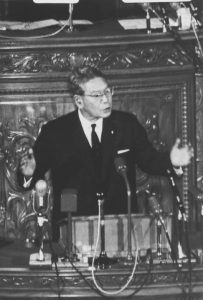Striving to fill voids in Hiroshima, unfinished judgment, Part 13: Japanese government’s reaction
May 5, 2024
Japanese government turns back on “violation of international law” ruling
Hayato Ikeda, Japan’s prime minister at the time, remarked, “That is a matter of some debate internationally. I do not intend to use this occasion to criticize the verdict arrived at by our own nation’s court of law.”
Mr. Ikeda, who was originally from Hiroshima Prefecture, made the remark on December 10, 1963, three days after the Tokyo District Court had handed down its verdict in which the atomic bombings were ruled to have been a violation of international law. He was responding to a request for his opinion on the verdict by an opposition Socialist Party member during a session of Japan’s Diet. Mr. Ikeda’s dissatisfaction with the verdict was revealed in his remark.
Japanese government: ruling lacks basis
The opposition lawmaker, who supported the verdict, continued his questioning of the government at budget committee and other meetings. The government’s responses included the idea that, “Without the existence of positive international law [prohibiting the use of atomic bombs], there is no basis for a ruling that the bombings represented a violation.” The government continued to make claims that had been contradicted by the court’s verdict and the expert opinions expressed by scholars of international law.
Information on the court’s verdict quickly made its way to the United States, the country that had dropped the atomic bombs. Two days after the verdict, an article published by a wire service was carried in Japanese newspapers that reported on remarks made by numerous leading figures in U.S. politics from both the Republican and Democratic parties. The U.S. leaders were reported to have stated that the Tokyo District Court’s condemnation would also apply to Japan’s attack on Pearl Harbor.
A backlash was inevitable from Americans who viewed the atomic bombings positively based on the reasoning that “the A-bombings ended the war.” The verdict recognized that the bombings were in violation of the Convention Respecting the Laws and Customs of War on Land (Hague Convention). Violations of international law involving war such as the Hague Convention are typically considered “war crimes.” Although the A-bomb trial did not pursue the responsible parties for the crime of the bombings and the term “war crimes” was never used in the verdict, that meaning was clear.
The verdict established the grounds for claims by A-bomb survivors and other citizens by indicating that nuclear weapons, if used, would be a violation of international law and a war crime, with their manufacture and possession also unacceptable. Immediately after the verdict, Yasuhiro Matsui, the plaintiffs’ attorney, proposed that an appeal not be filed. The plaintiffs agreed with Mr. Matsui. Although the claim for damages against Japan had been dismissed, the fact that the verdict called for expanded government relief measures was a consideration taken into account in their decision.
On the other hand, experts were consulted about whether they believed that the nation that won the court case had the right to appeal the verdict recognizing the dropping of the atomic bombs to be a violation of international law. Their conclusion was that the nation did not have the right to appeal. On December 17, as the verdict was being finalized, Japan’s Justice Minister Okinori Kaya was asked in the Diet whether he would respect the ruling. He replied, “I would respect the verdict, but I might not completely agree with it.”
Cornerstone of A-bomb survivor movement
Later, the verdict was finalized. The ruling had a major impact on the A-bomb survivor movement and the campaign to ban A- and H-bombs. The Japan Confederation of A- and H-Bomb Sufferers Organizations (Nihon Hidankyo) referred to the verdict in its 1984 “Basic Demands of A-Bomb Survivors” and other documents. The organization turned the verdict into the cornerstone of its movement seeking the abolition of nuclear weapons as well as national compensation for damages caused by the atomic bombings.
Meanwhile, the Japanese government, which was seeking the protection of the U.S. “nuclear umbrella,” continued to turn its back on the ruling that the bombings were in “violation of international law.” Nevertheless, leaders of the A-bombed cities made use of the verdict in making demands for the abolition of nuclear weapons in international courts.
Keywords
“Basic Demands of A-Bomb Survivors”
The “Basic Demands of Atomic Bomb Survivors” was a pivotal document of the movement announced by Nihon Hidankyo in 1984. The organization demands that the United States acknowledge the atomic bombings of Hiroshima and Nagasaki to be inhumane and in violation of international law, offer apologies to A-bomb survivors, and play a leading role in the abolition of nuclear weapons. The document calls on the Japanese government to provide support for the victims as national compensation, including the provision of condolence money and other support to the families of those who died in the aftermath of the A-bombings.
(Originally published on May 5, 2024)








